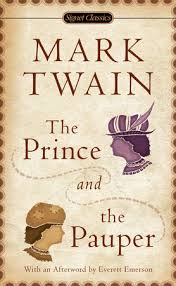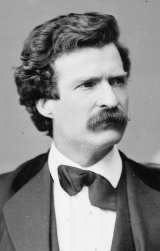The Prince and the Pauper Page #5
The Prince and the Pauper is a novel by American author Mark Twain. It was first published in 1881 in Canada, before its 1882 publication in the United States. The novel represents Twain's first attempt at historical fiction.
Suddenly a great drunken ruffian collared him and said-- “Out to this time of night again, and hast not brought a farthing home, I warrant me! If it be so, an’ I do not break all the bones in thy lean body, then am I not John Canty, but some other.” The prince twisted himself loose, unconsciously brushed his profaned shoulder, and eagerly said-- “Oh, art his father, truly? Sweet heaven grant it be so--then wilt thou fetch him away and restore me!” “His father? I know not what thou mean’st; I but know I am thy father, as thou shalt soon have cause to--” “Oh, jest not, palter not, delay not!--I am worn, I am wounded, I can bear no more. Take me to the king my father, and he will make thee rich beyond thy wildest dreams. Believe me, man, believe me!--I speak no lie, but only the truth!--put forth thy hand and save me! I am indeed the Prince of Wales!” The man stared down, stupefied, upon the lad, then shook his head and muttered-- “Gone stark mad as any Tom o’ Bedlam!”--then collared him once more, and said with a coarse laugh and an oath, “But mad or no mad, I and thy Gammer Canty will soon find where the soft places in thy bones lie, or I’m no true man!” With this he dragged the frantic and struggling prince away, and disappeared up a front court followed by a delighted and noisy swarm of human vermin. CHAPTER V. Tom as a Patrician. Tom Canty, left alone in the prince’s cabinet, made good use of his opportunity. He turned himself this way and that before the great mirror, admiring his finery; then walked away, imitating the prince’s high-bred carriage, and still observing results in the glass. Next he drew the beautiful sword, and bowed, kissing the blade, and laying it across his breast, as he had seen a noble knight do, by way of salute to the lieutenant of the Tower, five or six weeks before, when delivering the great lords of Norfolk and Surrey into his hands for captivity. Tom played with the jewelled dagger that hung upon his thigh; he examined the costly and exquisite ornaments of the room; he tried each of the sumptuous chairs, and thought how proud he would be if the Offal Court herd could only peep in and see him in his grandeur. He wondered if they would believe the marvellous tale he should tell when he got home, or if they would shake their heads, and say his overtaxed imagination had at last upset his reason. At the end of half an hour it suddenly occurred to him that the prince was gone a long time; then right away he began to feel lonely; very soon he fell to listening and longing, and ceased to toy with the pretty things about him; he grew uneasy, then restless, then distressed. Suppose some one should come, and catch him in the prince’s clothes, and the prince not there to explain. Might they not hang him at once, and inquire into his case afterward? He had heard that the great were prompt about small matters. His fear rose higher and higher; and trembling he softly opened the door to the antechamber, resolved to fly and seek the prince, and, through him, protection and release. Six gorgeous gentlemen-servants and two young pages of high degree, clothed like butterflies, sprang to their feet and bowed low before him. He stepped quickly back and shut the door. He said-- “Oh, they mock at me! They will go and tell. Oh! why came I here to cast away my life?” He walked up and down the floor, filled with nameless fears, listening, starting at every trifling sound. Presently the door swung open, and a silken page said-- “The Lady Jane Grey.” The door closed and a sweet young girl, richly clad, bounded toward him. But she stopped suddenly, and said in a distressed voice-- “Oh, what aileth thee, my lord?” Tom’s breath was nearly failing him; but he made shift to stammer out-- “Ah, be merciful, thou! In sooth I am no lord, but only poor Tom Canty of Offal Court in the city. Prithee let me see the prince, and he will of his grace restore to me my rags, and let me hence unhurt. Oh, be thou merciful, and save me!” By this time the boy was on his knees, and supplicating with his eyes and uplifted hands as well as with his tongue. The young girl seemed horror-stricken. She cried out-- “O my lord, on thy knees?--and to me!” Then she fled away in fright; and Tom, smitten with despair, sank down, murmuring-- “There is no help, there is no hope. Now will they come and take me.” Whilst he lay there benumbed with terror, dreadful tidings were speeding through the palace. The whisper--for it was whispered always--flew from menial to menial, from lord to lady, down all the long corridors, from story to story, from saloon to saloon, “The prince hath gone mad, the prince hath gone mad!” Soon every saloon, every marble hall, had its groups of glittering lords and ladies, and other groups of dazzling lesser folk, talking earnestly together in whispers, and every face had in it dismay. Presently a splendid official came marching by these groups, making solemn proclamation-- “IN THE NAME OF THE KING! Let none list to this false and foolish matter, upon pain of death, nor discuss the same, nor carry it abroad. In the name of the King!” The whisperings ceased as suddenly as if the whisperers had been stricken dumb. Soon there was a general buzz along the corridors, of “The prince! See, the prince comes!” Poor Tom came slowly walking past the low-bowing groups, trying to bow in return, and meekly gazing upon his strange surroundings with bewildered and pathetic eyes. Great nobles walked upon each side of him, making him lean upon them, and so steady his steps. Behind him followed the court-physicians and some servants. Presently Tom found himself in a noble apartment of the palace and heard the door close behind him. Around him stood those who had come with him. Before him, at a little distance, reclined a very large and very fat man, with a wide, pulpy face, and a stern expression. His large head was very grey; and his whiskers, which he wore only around his face, like a frame, were grey also. His clothing was of rich stuff, but old, and slightly frayed in places. One of his swollen legs had a pillow under it, and was wrapped in bandages. There was silence now; and there was no head there but was bent in reverence, except this man’s. This stern-countenanced invalid was the dread Henry VIII. He said--and his face grew gentle as he began to speak-- “How now, my lord Edward, my prince? Hast been minded to cozen me, the good King thy father, who loveth thee, and kindly useth thee, with a sorry jest?” Poor Tom was listening, as well as his dazed faculties would let him, to the beginning of this speech; but when the words ‘me, the good King’ fell upon his ear, his face blanched, and he dropped as instantly upon his knees as if a shot had brought him there. Lifting up his hands, he exclaimed--
Translation
Translate and read this book in other languages:
Select another language:
- - Select -
- 简体中文 (Chinese - Simplified)
- 繁體中文 (Chinese - Traditional)
- Español (Spanish)
- Esperanto (Esperanto)
- 日本語 (Japanese)
- Português (Portuguese)
- Deutsch (German)
- العربية (Arabic)
- Français (French)
- Русский (Russian)
- ಕನ್ನಡ (Kannada)
- 한국어 (Korean)
- עברית (Hebrew)
- Gaeilge (Irish)
- Українська (Ukrainian)
- اردو (Urdu)
- Magyar (Hungarian)
- मानक हिन्दी (Hindi)
- Indonesia (Indonesian)
- Italiano (Italian)
- தமிழ் (Tamil)
- Türkçe (Turkish)
- తెలుగు (Telugu)
- ภาษาไทย (Thai)
- Tiếng Việt (Vietnamese)
- Čeština (Czech)
- Polski (Polish)
- Bahasa Indonesia (Indonesian)
- Românește (Romanian)
- Nederlands (Dutch)
- Ελληνικά (Greek)
- Latinum (Latin)
- Svenska (Swedish)
- Dansk (Danish)
- Suomi (Finnish)
- فارسی (Persian)
- ייִדיש (Yiddish)
- հայերեն (Armenian)
- Norsk (Norwegian)
- English (English)
Citation
Use the citation below to add this book to your bibliography:
Style:MLAChicagoAPA
"The Prince and the Pauper Books." Literature.com. STANDS4 LLC, 2025. Web. 5 Feb. 2025. <https://www.literature.com/book/the_prince_and_the_pauper_315>.








Discuss this The Prince and the Pauper book with the community:
Report Comment
We're doing our best to make sure our content is useful, accurate and safe.
If by any chance you spot an inappropriate comment while navigating through our website please use this form to let us know, and we'll take care of it shortly.
Attachment
You need to be logged in to favorite.
Log In